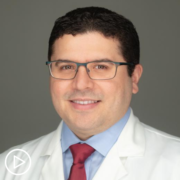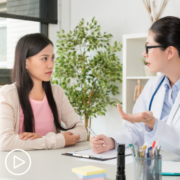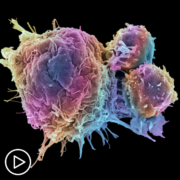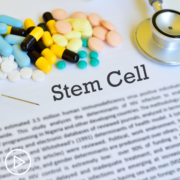How Can Diffuse Large B-Cell Lymphoma Patients Manage Treatment Symptoms? from Patient Empowerment Network on Vimeo.
How can diffuse large B-cell lymphoma (DLBCL) treatment symptoms be managed? Expert Dr. Nirav Shah from the Medical College of Wisconsin explains common symptoms and side effects that patients experience and how they can help in managing their care along with their team.
Dr. Nirav Shah is an Associate Professor at the Medical College of Wisconsin. Learn more about Dr. Shah.
[ACT]IVATION TIP:
“…call us. Let us know what’s going on. We can’t help you with your symptoms if we’re not aware, and we don’t mind those phone calls because we want to help patients through that journey.”
See More from [ACT]IVATED DLBCL
Download Resource Guide
Download Resource Guide en español
Related Resources:
Transcript:
Lisa Hatfield:
So, Dr. Shah, newly diagnosed DLBCL patients, they come in and typically, you would most likely prescribe a chemotherapy regimen, and then maybe down the road they may see something like CAR-T therapy. Can you explain what type of symptoms they may or may not have, and how they can manage those symptoms and maybe even a tip on who to call when they experience symptoms?
Dr. Nirav N. Shah:
Yeah, it’s a great question, Lisa. So the front-line regimen for diffuse large B-cell lymphoma in 2023 is a combination chemotherapy regimen. The good news is we’ve gotten so much better at delivering these drugs in a safe and efficacious manner, we’re really good at preventing those horrible things that we think about when we watch movies of people vomiting all the time and being nauseous and losing weight. We have really good antiemetics, we develop a program to deal with nausea or vomiting should it occur, and escalate our treatments to prevent it in those patients that are more sensitive to the chemotherapy drugs.
That being said, it’s still chemotherapy. And so people do feel the side effects. I think the hardest side effect for a lot of people to endure is hair loss, these combination chemotherapy do cause hair loss, and then that often is even a little bit harder for women, just given the stigma for hair and how important that is to some of our female patients, and so these are challenges that I try to discuss with patients to help them anticipate. Again, we have lots of different services at our institution, we have a wig service, a place for people to go to find options on how to deal with that.
The biggest medical symptoms that I tell people that everybody experiences is just fatigue. We’re putting poison in your body to kill a cancer. We’re doing it for a good reason, but that just wipes people out. Most patients will not have the energy, the appetite, the drive that they normally have when they’re feeling well. And again, for the most part, that’s short-lived, but for some patients that can even last three to six months after completing their chemotherapy regimen. There’s lots of individual side effects that I warn them about, the one that I am most concerned about for my patients is infection, because chemotherapy doesn’t only kill the part of the immune system, the lymphoma, it can also weaken the immune system, a part of the immune system that is there to protect you from infection.
And so we tell them to monitor for fevers, and if they’re not feeling well to call us in. We provide our patients numbers for 24/7 contact. So we have a number that they can call to, and no matter when they call, they’ll be able to get either an on-call provider or the team if it’s during the daytime, to be able to help them with whatever issue or symptoms that they’re having. And so my activation point to my patients is, call us. Let us know what’s going on. We can’t help you with your symptoms if we’re not aware, and we don’t mind those phone calls because we want to help patients through that journey.
Share Your Feedback:
Create your own user feedback survey









